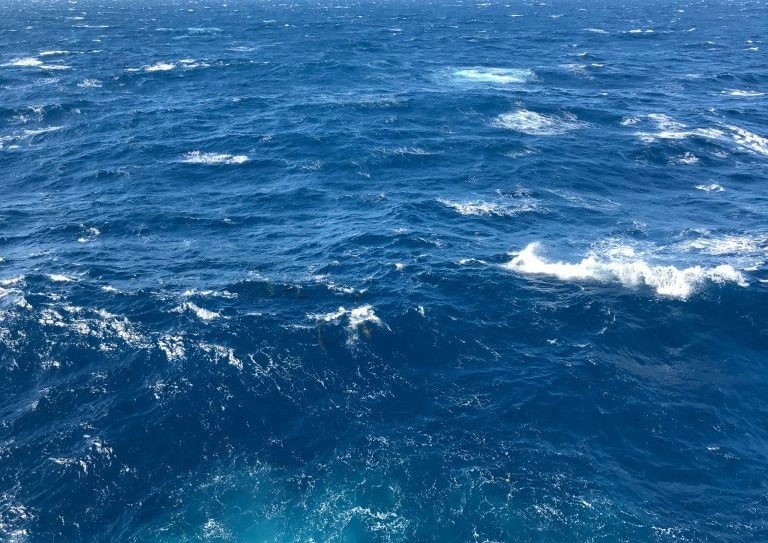The oceans help to minimize global warming by absorbing carbon dioxide emissions. However, researchers have discovered that future intense warming could reduce that ability, leading to even greater warming.

Choppy seas over the Gulf of Mexico, 2017. Research led by the University of Texas Institute for Geophysics found that future warming could trigger chemical changes in the ocean surface that accelerate global warming. Image Credit: Jackson School of Geosciences/Tiannong “Skyler” Dong
The finding comes from research led by The University of Texas at Austin in which researchers examined a climate simulation configured to a worst-case emissions scenario and discovered that the oceans’ ability to absorb carbon dioxide (CO2) would peak by 2100, becoming only half as efficient by 2300.
The decrease is caused by the formation of a surface layer of low-alkalinity water, which reduces the ability of the oceans to absorb CO2. Alkalinity is a chemical property that influences the amount of CO2 that can dissolve in seawater.
Although the study’s emissions scenario is unlikely due to global attempts to curtail greenhouse gas emissions, the study reveals a completely undiscovered tipping point that, if activated, would release a significant brake on global warming, according to the authors.
We need to think about these worst-case scenarios to understand how our CO2 emissions might affect the oceans not just this century, but next century and the following century.
Megumi Chikamoto, Institute for Geophysics, University of Texas
Megumi Chikamoto guided the research as a research fellow.
The research was published in the journal Geophysical Research Letters.
Currently, the oceans absorb roughly one-third of all CO2 emissions produced by humans. Prior climate simulations had shown that the oceans slow their CO2 absorption over time, but none had assumed alkalinity as an explanation. To arrive at their conclusion, the scientists recalculated parts of a 450-year simulation until they identified alkalinity as a major cause of the slowing.
The effect, according to the research results, commences with extreme climate change, which increases rainfall and slows ocean currents. This covers the ocean’s surface in a warm layer of fresh water that will not merge easily with the cooler, more alkaline waters beneath it. As this surface layer becomes more CO2-saturated, its alkalinity decreases, as does its ability to absorb CO2.
The result is a surface layer that acts as a CO2 absorption barrier. This means that less greenhouse gas enters the ocean and more remains in the atmosphere. This causes faster warming, which helps to maintain and strengthen the low-alkalinity surface layer.
The discovery, according to co-author Pedro DiNezio, an Affiliate Researcher at the University of Texas Institute for Geophysics and Associate Professor at the University of Colorado, is a strong reminder that the world really needs to reduce CO2 emissions to avoid touching this and other tipping points.
Whether it’s this or the collapse of the ice sheets, there’s potentially a series of connected crises lurking in our future that we need to avoid at all costs.
Pedro DiNezio, Study Co-Author, Affiliate Researcher, Institute for Geophysics, University of Texas
The next step, he says, is to determine whether the alkalinity mechanism is activated under lower-emission scenarios.
The results of the study, according to co-author Nikki Lovenduski, a Professor at the University of Colorado who made a significant contribution to the Intergovernmental Panel on Climate Change 2021 climate report, will help scientists make better estimates about future climate change.
This paper demonstrates that the climate change problem may be exacerbated by things that are as yet unknown. But the ocean climate feedback mechanism this particular study revealed will open up new avenues of research that will help us better understand the carbon cycle, past climate change and perhaps come up with solutions for future problems.
Nikki Lovenduski, Study Co-Author and Professor, University of Colorado
The research was financially supported by the National Science Foundation. UTIG is a research unit of UT Jackson School of Geosciences.
Journal Reference
Chikamoto, M. O., et al. (2023) Long-Term Slowdown of Ocean Carbon Uptake by Alkalinity Dynamics. Geophysical Research Letters. doi.org/10.1029/2022GL101954.
Source: https://www.jsg.utexas.edu/